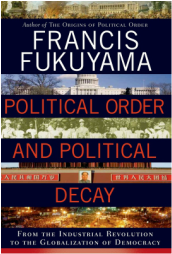
The sequel to The Origins of Political Order, it might be a little less captivating because there’s far fewer eunuchs/Janissaries/investiture conflicts/war elephants and a whole lot more civil service reform.
But the commentary on the current trajectory of the U.S. is a point in its favor.
This volume is about how the state becomes modern -- that is, with the rule of law, a strong executive, and accountability to the public -- and how that state can decay. Unlike the first one, it is not at all chronological, instead looking at different countries in sequence.
One of the main reasons European countries developed modern states earlier than elsewhere in the world, Fukuyama argues, is that they were forced by the constant threat of war to improve administrative capability and foster a sense of national unity. He paraphrases Machiavelli: “just outcomes in the present are often the result of crimes committed in the past.”
South America lagged Europe in developing modern political states, Fukuyama claims, in main part because war was not as prevalent as it was in Europe leading into the 20th century.
One cool thing about this book is the thoughtful but sweeping judgments of entire continents.
For instance, Fukuyama muses that South America may be slightly ahead of sub-Saharan Africa in terms of state-building because South America was colonized by Europe at a time when Europeans, influenced by Christianity, believed that South Americans had souls of equal worth, whatever the depredations imposed on them. African colonization, on the other hand, took place over a shorter span of time when Europeans were instead influenced by scientific Darwinism and the belief that Europeans were in some deeper sense better than Africans. As a result, African colonization was more horrific.
Asian development of institutions, on the other hand, outpaced that of Africa because throughout history Asian countries had a stronger sense of nationality, including common languages. As a result, they didn’t didn’t have to do nation-building at the same time as state building the way Africa had to. One longer case study in the book is the country of Nigeria, which has not only a North and South divided by religion, but also hundreds of sub-ethnic groups among whom it was historically there were a lot of barriers to national unity and patriotism.
In doing this analysis, Fukuyama is synthesizing the work of previous historians, sociologists, anthropologists, and economists. In particular, a lot of it is based on the writings of Samuel Huntington.
Fukuyama referees the ongoing debate between those who ascribe economic development to geography and those who would attribute it to institutions. The leaders in this debate are Jared Diamond and the economist Jeffrey Sachs on the one hand, and the economists Daron Acemoglu, James Robinson, and Simon Johnson on the other. Fukuyama notes that ultimately Acemoglu et al., who claim that institutions are key, chalk up the development of institutions to geographical differences, so there is not as much space between the two sides as they might think.
Nevertheless, he says that Costa Rica is a decisive counterexample to the argument that geography is destiny. Costa Rica could easily have ended up like its nearby neighbors El Salvador and Nicaragua. Instead, it is two to three times as rich, and hasn’t had civil wars in the past half century-plus. That’s a result of choices made by political leadership, he says.
Similarly, Argentina could be a nation-state on the level of the U.S. or the U.K., based on geography, natural resources, and colonial history. Instead, it’s a basket case -- in the news this month because of a seeming high-profile political assassination, among other fiascos -- because of choices made by the country’s elites throughout its history.
Just as it is difficult for countries to achieve modern political states, it is easy for them to lost them, Fukuyama argues.
The fundamental underlying dynamic of politics is humankind’s gravitation toward kin selection and reciprocal altruism, in Fukuyama’s reckoning. In volume one, he traces those urges back to the evolutionary psychology of humans in volume.
While the modern state is intended to replace those propensities with political and economic development, it can be degraded by them over time.
Fukuyama labels that process repatrimonialization, or the “capture of ostensibly impersonal state institutions by powerful elites.”
In the U.S., he writes, the state is increasingly captured by interest groups, and “the apparently irreversible increase in the scope of government in the twentieth century has masked a large decay in its quality.” He goes through specific administrative functions that no longer serve their original purpose, including an extended discussion of the Forest Service.
Although Fukuyama sees political decay in a number of countries, he blames it in the U.S. to an overreliance on cours and on the sheer number of veto points stopping administrative action.
In the U.S., he argues, too many administrative powers allocated to courts and political parties. The U.S. gets social (and economic) changes through courts that would be done through the administration in other advanced countries.
That’s in part because of the number of institutions, such as the presidency and the Senate filibuster, that can veto direct action. Because of those factors, Americans seeking social change turned to the courts early and have become accustomed to imposing sweeping changes through the courts. Elections that are hugely consequential in determining judges, and yet winning parties have little scope to set policy through the executive.
As a result, the “law lost its focus on a constraint of government and instead became an instrument for widening the scope of government,” Fukuyama argues.
“For fear of empowering ‘big government,’ the United States has ended up with a government that is equally large but actually less accountable because it is in the hands of the courts,” he writes.
The U.S. is undoubtedly suffering political decay, in his mind. Meanwhile, China, with its system of experienced administrators with massive discretion but much less accountability, is possibly sketching out an alternative model.
While I don’t buy all of Fukuyama’s conclusions, I love his style of synthesis and the extremely wide range of fields and topics he covers.
He acknowledges early in the first volume that he’s trying to synthesize far more than can ever be generalized. I have no doubt that historians would take issue with some of his history, sociologists with some of his sociology, etc.,
Nevertheless, my sense is that his overarching analysis is robust to mistakes made at the granular level.
Just as an example, he makes a glaring factual error in one of the few sections that relates to something I know -- the U.S. financial regulatory system. In describing the patchwork system of agencies that imposes endless veto points on policy, he refers to the Office of Thrift Supervision.
Of course, the OTS was abolished in the 2010 Dodd-Frank financial reform law, for the reason that Fukuyama criticized it (it was captured by the industry, and duplicative with other agencies).
Nevertheless, the larger passage in which this error appeared still made sense even with the mistake, which makes me feel more confident in the rest of his analysis.


